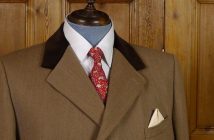Men’s bespoke tailoring has seen many changes over the past two decades. Timothy Everest pioneered the New Bespoke Movement in the 1990s, offering the quality of Savile Row to a wider audience and stamping the customer’s individuality on the classic British suit. With the market ever competitive and having to hold its own against the luxury fashion brands, a new movement from the world of tailoring is rearing its head in the form of bespoke casual wear, once again being pioneered by that trailblazer of British fashion. Our intrepid Editor went to meet the man behind the brand to find out where it all began, how it evolved and what the future holds.
I arrived at the design studio for a tour with manager Stacey Cotter, who showed me drawings and photos of the new bespoke casual range and an example of the wonderfully dandy Rapha bicycle suit made with a technologically advanced fabric that is both light and waterproof – which she proceeded to demonstrate by pouring a glass of water over it – and in defiance of all those product demonstrations that go horribly wrong, the water simply beaded away.
The studio is industrial and decked out with widescreen PCs and tables piled with fabric samples, magazine cuttings, technical sketches and licensed products. It is a vibrant and modern environment and a complete contrast to the tailoring house on Elder Street where I was taken next; a Georgian townhouse lovingly restored and decorated with a dash of Tim’s flamboyant but quintessential tastes. Yellow-washed walls, creaking stripped floorboards, reclaimed radiators, old-fashioned light switches and colourful displays of fabrics and garments add to the cosseting atmosphere of a special abode where magical things are happening.
Tim’s passion for his business and the Elder Street atelier in particular is evident from the outset as he takes me from floor to floor – the fitting room, the fabrics room, the cutting room, the stitching room – enthusing over this vibrant working fashion house and the dedicated staff that help to create such wonderful clothing. It’s like walking around with a child whose been given the keys to Willy Wonka’s chocolate factory, and his fervour is infectious. Indeed, this personal approach is one of the reasons that clients find themselves coming here time and again. It has always been said that visiting a tailor is like escaping to a private club where people know your name and don’t have to ask how you take your tea. Like a well made suit, Tim’s customers find the whole experience very fitting.
From a crisp blue city suit with subtle coloured stitching to an Edwardian style three-piece with clever adjustments for those who still like to carry a pocket watch, the attention to detail is impressive. On the top floor, two seamstresses studiously hand-stitch hundreds of delicate patterns into a bespoke-casual jacket they are creating for a client in New York. It is eye-opening, encouraging and enlivening to see such an operation at work in the heart of London. There is something very British and quirky about it, a bit like Tim’s own story…
From the age of eleven and into his teens, Everest had always been interested in clothing and fashion trends. After moving from Canterbury to Wales with his parents, he was given a job with an uncle at a High Street tailor called Hepworth that later became the Next retail empire. “They were like Burton’s at the time; you could have things made to measure or you could have them off the peg, and that was quite normal back then. We were on the west coast of Wales and like the last bastion of the empire. It was still like 1950s retail and it was absolutely hysterical.”
This Are You Being Served environment exposed Tim to the old fashioned world of menswear, where the tailor was as important in the community as the butcher, the baker and the bank manager. And like a sitcom, his days at Hepworth were often filled with comedy. “My boss was very blind, and in the first week that I was there he actually gave the customer’s credit card and receipt to the mannequin, and I thought, what’s going on? I had to tell him that the customer was to his left, to which he replied, “Of course I know that, boy!”” Cue canned laughter.
But a young man needs a social life and it wasn’t long before Tim was venturing further afield to let his hair down amidst the vibrant pop culture of the 1980s. “I started driving up to London with mates and going to The Blitz Club and all that early Eighties stuff, hanging out with Boy George and dressing up and chasing girls who must have run a mile with all that make up we wore. It was very appealing, that whole culture was fascinating with all those different characters.”
London’s bright lights and buzzing club scene were drawing young men from far and wide and Tim decided that it was time to join the culture club permanently. He wanted to get a job in fashion and at the time regarded the world of tailoring as very outmoded. Back then as now, the fashion industry wasn’t easy to break into and Tim had to default to what he knew best to bide his time. This was perhaps the most important moment of his career.
“I saw an advert for Tommy Nutter in the Evening Standard that said ‘Boy wanted in Savile Row’, and I was under pressure because a couple of mates had got jobs in London and they were very smug. So I went along to see Tommy and he said, “Have you heard of me?”, and I said yes but I was lying. And he started telling me about himself, that he did all the Beatles’ suits on the Abbey Road album cover and I thought – he’s quite fashionable, this is a really good job – but he didn’t offer me the job so I pestered him for about three weeks. He eventually gave me a trial which lasted for nearly five years.”
Tommy Nutter is a legend in the world of tailoring and changed the face of Savile Row in no small way. During the 1960s he made classic tailoring available to rock stars and celebrities, helping to stamp their individuality on the suits they had designed. “Tommy’s client base was very interesting. Everybody thought he just dressed the Beatles and the Stones, but we had a lot of people like politicians and people working in finance who didn’t want to be wearing suits. It was a fashion statement to go to Nutter’s – and nowadays to come to me – for just a really nice sharp blue suit, but in their mind it’s different because it’s made by someone who dresses fashionable people like rock stars.”
Nutter was a communicator and his skill was to open the world of bespoke tailoring to a wider fashion-conscious audience that went far beyond the traditional business suit. “Tommy was very good at articulating to a new audience what bespoke was all about.” Something of a celebrity himself, Tommy came to work one morning to find John Lennon and Yoko Ono standing naked in his shop window, and was later called over to Apple Studios to hear Hey Jude before it was released. “Paul and John asked him what he thought and he said it was a load of sh*t.”




